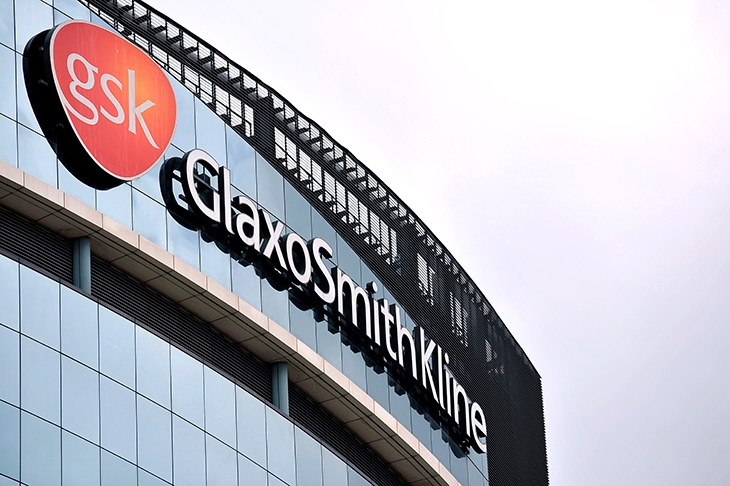Keep your eye on GlaxoSmithKline. The UK-based multinational drug-maker represents the future, both as a mass-producer of the vaccines that we pray will finally defeat Covid-19 and as a beacon of the way shareholder capitalism will re-position itself in the post-pandemic era.
GSK last week announced a collaboration with its French rival Sanofi to create a Covid-19 vaccine that it aims to manufacture at the rate of ‘hundreds of millions of doses annually’ by the end of next year. That’s 20 months before we might begin to feel safe again but still ‘a significantly faster timeline than for normal vaccine development’. And science apart, what was eye-catching in the statement by GSK chief executive Emma Walmsley is that she does not ‘expect to profit from our portfolio of collaborations… during this pandemic’. Any short-term profit generated will be re-invested in virus research and ‘long-term pandemic preparedness’, while making vaccines available to the world’s poorest countries will also be ‘a key part of our efforts, including donations’.
Those aspirations give serious meaning to the fashionable mantra of ‘purpose before profit’ with which many other companies were toying — mostly in terms of long-dated net-zero-carbon pledges — before the pandemic. GSK’s press release on its Covid-19 response also speaks of ‘protecting the health and wellbeing of our people and managing our global supply chains to support patients and consumers’. But it contains no mention of shareholders and you may think that’s entirely right: any company with vital resources to help in this crisis should be doing just that, leaving normal financial factors (other than survival) aside.
But when it’s all over, the surviving beacons of capitalism will also need to re-assert the older mantra that profit is healthy because it pays taxes and pensions and fertilises growth; and that risk-capital must be properly rewarded or it will wither away. The companies best placed to do that will be the ones like GSK that — we must fervently hope — have had a good crisis.
Alphas and bass players
Emma Walmsley is an admiral’s daughter with a plainness of style that feels right for the times. Likewise Richard Walker, managing director (and founder’s son) of Iceland supermarkets, who gave a good account of himself on Any Questions?, responding ‘If it’s anyone’s fault, it’s mine’ to an anecdote of mistreatment of NHS workers in one of his stores. Meanwhile, we wait to see how the former Goldman Sachs and London Olympics chief Lord Deighton grasps the role of ‘PPE tsar’ — while many other big shots who might have had something useful to say or deliver stay well out of the limelight.
The boss of a debt-laden FTSE 250 company that went to the brink in 2008 reminds me how business careers are shaped by extreme conditions: ‘The gobby alphas were too beset by self-preservation and bowel movements to be of any real use. It was the solid bass players in the band who helped us prevail and prosper again.’ This time, some of the gobbiest, led by Tim Martin of Wetherspoons and Mike Ashley of Sports Direct, struck out early. But it will be fascinating to watch new talent rise. Empathy, calmness, grit — and, of course, the ability to articulate ‘purpose’ — will be the key.
Whatever the weather
Here in Yorkshire we clap for our carers with gusto, but we also salute our farmers as their tractors rumble past, offering a semblance of continuing economic life. Inured to storm, flood and pestilence, their attitude is unchangingly stoical. Wholesale veg and dairy prices have fallen despite booming supermarket sales; restaurant closures have savaged the meat trade; tanker drivers for milk and ‘red diesel’ are in short supply, as well as fruit-pickers and slaughtermen; recent wet and dry spells mean 2020’s harvest could be the worst for years, and the EU Basic Payment per hectare (due for the last time) is likely to be fixed at an all-time adverse exchange rate. ‘But let’s not overdramatise,’ says my man on the big crop sprayer. ‘We’re not the front line, we’re just doing what we’ve done for ever, producing food whatever the weather — and hoping one day politicians and consumers will put a proper value on food security.’
Speak, Prime Minister!
I made my debut in The Spectator’s 8,544th issue, having become a reader as a schoolboy at around no. 7,400 in 1970 — so it’s a joy to raise my solitary glass (of a delicious Pinot Gris d’Alsace from Cave de Turckheim, since you ask) to our 10,000th. Over that half-century I’ve observed many economic shocks, though none quite like this one. I’m reminded nevertheless of what I wrote in the depths of October 2008, comparing conditions then to my experience of early-1990s post-Soviet Eastern Europe, when politicians, technocrats and bankers like me were ‘thrashing around trying to invent ways of kickstarting moribund economies’.
Often you would hear the old joke about an Irishman asked for directions by a tourist: ‘Well if I were you, I wouldn’t start from here.’ But the similarity was ‘that any positive idea is worth considering and that big, bold schemes are more likely to work than small, footling ones’ — which is certainly true again, the Chancellor’s new £1.2 billion fund for co-investment in and loans to innovative tech start-ups being a welcome case in point.
But I went on to cite another resonance between 1991 and 2008, which really doesn’t apply today: ‘Well-phrased, comforting speeches made no difference at all.’ Though I wince at the memory of being cruelly upstaged by Boris Johnson’s high-octane oratory when I followed him to the podium at The Spectator’s 175th birthday party, we desperately need to hear him now.
Scorn your critics, Prime Minister, and improvise if you have to — you’ve done
that often enough — but exercise your gift and give us a glimmer of hope of an end to this nightmare.
Got something to add? Join the discussion and comment below.
Get 10 issues for just $10
Subscribe to The Spectator Australia today for the next 10 magazine issues, plus full online access, for just $10.
You might disagree with half of it, but you’ll enjoy reading all of it. Try your first month for free, then just $2 a week for the remainder of your first year.















Comments
Don't miss out
Join the conversation with other Spectator Australia readers. Subscribe to leave a comment.
SUBSCRIBEAlready a subscriber? Log in